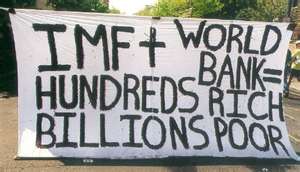Iceland faced a bank crisis similar to America’s.
But instead of kowtowing to the ego-bloated, “too big to fail” bankers (like America did), Iceland told the bankers to take a hike.
Then Icelanders started over … without the international banks and stock markets dominating their finances.
The result? Iceland is recovering and functioning again … normally.
It could have been done here too … but, alas, Americans are still proud of their government and their bankers.
Too bad!
———————————–
Once poster child of crisis, Iceland recovers

By Mia Shanley –
GRINDAVIK, Iceland (Reuters) – In this small Icelandic village, sailors are making double their pre-crisis pay, haddock sales to places like Boston and Brussels are booming and unemployment is almost zero – signs of this island’s surprisingly rapid rise from the ashes of banking ruin.
While much of Europe wallows in recession, the economy of this volcanic island in the mid Atlantic is growing at a clip that has surprised many people, thanks to a currency fall – in which the crown lost almost half its value to the euro – an export and tourism boom as well as growing consumer confidence.
“This is probably one of our best years,” said Arnthor Einarsson, a fisherman readying his boat for his next catch as seagulls circle huge piles of fishing nets on a rocky peninsula about one hour south of the capital Reykjavik.
Only a few years ago, a banking boom in which the sector’s assets grew to 10 times the country’s GDP lured many of Iceland’s 320,000 population from traditional industries into the world of finance. Fisherman got into banking and sailors speculated on booming real estate.
Those heady days have gone … a sign perhaps of a more sober consumer mood in which economic growth is based on a steady expansion of exports rather than flash-in-the-pan speculation.
The wounds that sparked massive street protests against the financial elite are slowly healing. Even the then prime minister has been tried by a special court, closing one chapter.
Granted, there is still a long way to go, but many see Iceland as offering a lesson particularly to European countries such as Greece and Spain, stuck with shrinking economies and lacking the option of devaluing to boost their international competitiveness.
Iceland’s GDP growth estimated at some 2.6 percent this year will outshine even powerhouses like Sweden.
“These are among the highest numbers in Europe,” said Finance Minister Steingrimur Sigfusson.
Currency depreciation is only part of the picture.
Iceland also did what other parts of Europe haven’t dared to do – let its banks go under. It took some of the cost itself but forced foreign creditors to take the biggest hit.
BACK TO BASICS
Three years after its near meltdown, Iceland looks healthy on many measures. It successfully finished an IMF bailout program and has already made one early repayment. It expects the sale of assets from failed bank Landsbanki to cover its $5 billion in debts to Britain and the Netherlands.
In February, Iceland recovered its investment-grade rating from Fitch, which praised the country for restoring macroeconomic stability, adding to investment-grade ratings from Standard and Poor’s and Moody’s Investors Service.
Icelanders are getting work, going shopping and their house prices are rising again.
And while the penthouse of a gleaming new skyscraper in down town Reykjavik sits empty, Icelanders are piling into a hip new restaurant on the ground floor called the Hamburger Factory.
Car sales doubled in the first quarter. Jon Olafsson, who runs an auto dealership on the outskirts of Reykjavik, expects to sell almost 1,000 cars this year, having sold less than 100 cars in 2009.
“This is a high volume day for us,” he says, pointing at a shiny row of cars just rolled out on his lot. His customers are back en masse, hunting for leaner, greener cars, and he is recruiting staff to meet demand.
While signs point to recovery, many remain cautious about the future and bitter over the past.
There is little trust in government three years after the fall of ex-Prime Minister Geir Haarde. Parliament has the support of only 10 percent of the public, polls show.
CLOSE THE TRENCHES
Many just want a clean slate.
Haarde, the world’s only political leader to be tried for crimes related to the global crisis, was found innocent of major charges of gross negligence but guilty of failing to hold dedicated cabinet meetings ahead of the collapse.
In the months ahead, Iceland will bring former banking executives to stand trial, so the pain is not over.
Icelanders will meanwhile get on with their recovery.
“Did Icelanders have an identity crisis? Yes,” said Egill Helgason, one of Iceland’s best-known television commentators. “They thought they were financial wizards, but it was all an illusion … Now it’s back to books, music, and well, fish.”
______________________________________________________________________
